Teodor Reljic's Blog, page 15
June 4, 2016
Witch
‘Witch’ by Goblin, composed for Dario Argento’s giallo classic Suspiria (1977) appears to have a compelling series of tributes – deliberate, direct or otherwise – in more recent songs. But I am not a music critic is this is all based on intuition.
Valhalla Rising – Theme – Peter & Peter Kyed
The occult connection is something of a given in this, one of my favourite films of all time, but Peter & Peter Kyed’s main theme to Nicolas Winding Refn’s Valhalla Rising carries over the same ominous percussion as Goblin’s incantatory trip. Bonus link: Refn is a dedicated giallo fan who will be putting his money where his mouth is.
Burn the Witch – Queens of the Stone Age
Certainly a more upbeat experience than either of the above, but the breathy-screamy sample at the beginning marks a clear link to its goblinoid predecessor. Radiohead’s recent namesake track channels The Wicker Man instead – shoving us into northern climes far from Argento’s Italy but closer to Refn’s own sublime and brutal hills. Bonus link: Both Valhalla Rising and The Wicker Man were shot in Scotland.


May 18, 2016
Fleaing

Flea market, Birgu, Malta (2013)
“The flea market ethos, like many countercultural values, paid its respects to a modernist notion of prelapsarian authenticity. In an age of plastic, authentic material value could only be located in the “real” textures of the preindustrial past, along with traces of the “real” labor that once went into fashioning clothes and objects. By sporting a while range of peasant-identified, romantic proletarian, and exotic non-Western styles, students and other initiates of the counterculture were confronting the guardians (and the workaday prisoners) of commodity culture with the symbols of a spent historical mode of production, or else one that was “Asiatic” and thus “underdeveloped.” By doing so, they singled their complete disaffiliation from the semiotic codes of contemporary cultural power. In donning gypsy and denim, however, they were also taunting the current aspirations of those social groups for whom such clothes called up a long history of poverty, oppression and social exclusion. And in their maverick Orientalism, they romanticized other cultures by plundering their stereotypes.” – Andrew Ross
*
Read previous: BODYING
Read related: Flea markets and hypogeums


April 4, 2016
From the day job: Bats vs Supes and Norse sagas now
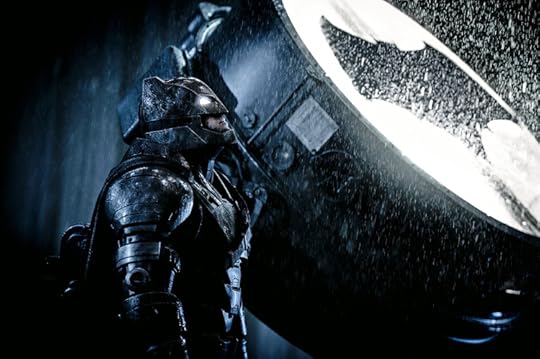
Signal to nothing: Ben Affleck as Bruce Wayne/Batman in Zack Snyder’s Batman v Superman: Dawn of Justice
I had a couple of fun articles out in last Sunday’s edition of MaltaToday.
One of them is a review of that obscure indie film that’s garnering obscene amounts of critical attention, Batman v Superman: Dawn of Justice.
The other was actually satisfying to research and execute: an interview with Icelandic poet and fiction writer Gerður Kristný, who will be visiting our shores on the occasion of the Campus Book Festival, taking place at the alma mater this midweek.
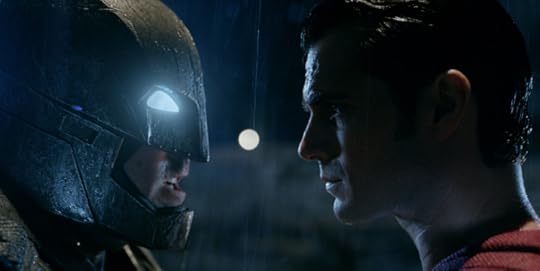
The fight of the century? Hardly. Loving Batfleck’s chunky digs though.
Batman v Superman: Dawn of Justice was, to my eyes, clumsy and misguidedly grandiloquent as its chunky title would suggest. And while there’s no love lost between me and Zack Snyder – much to his pained consternation, I’m sure – I didn’t go into the film as a hater, and wanted to enjoy it as, at least, the kind of omnishambles mess of the Jupiter Ascending ilk.
Alas, the film was a plethora of missed opportunities for fun and games because it was clearly all about setting up a future franchise to compete with Marvel’s already far-advanced “shared universe”, and while the film got a lot of flack for being joyless due to Snyder’s continued efforts to ape Christopher Nolan’s billions-raking reinvention of Batman, I think the real reason it felt bereft of the adrenaline jolt of pulpy fun was that it wasn’t in fact allowed to be pulp because it needed to do double-duty in setting up DC’s response to the Marvel behemoth, asap.

Gerður Kristný • Photo by Þórdís Ágústsdóttir
Gerður Kristný told me quite a few interesting things, but perhaps the most striking are the following:
“The original meaning of the word stupid (‘heimskur’) in Icelandic refers to the one that is always at home (‘heim’). People believed it would bring wisdom to leave your island and travel. We still believe so.”
“Coming from a country not many people know gives you opportunity to reinvent yourself, make up stories about yourself and your country.”
There was also some stuff about the Icelandic landscape and the island’s much vaunted literary culture – and what I loved is that no bubbles were burst in my conception of what looks to be a truly magical place, which I hope I’ll get to visit some day soon.


March 31, 2016
Bodying
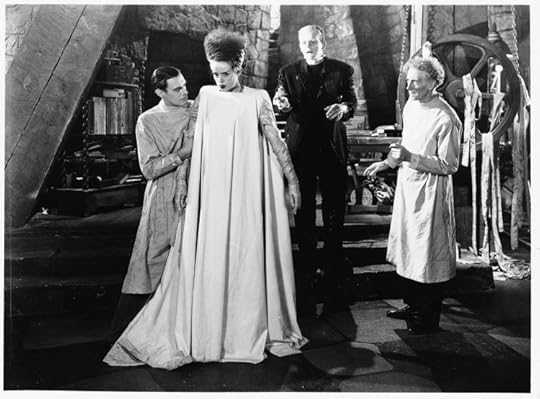
Colin Clive, Elsa Lanchester, Boris Karloff and Ernest Thesinger in Bride of Frankenstein (dir. James Whale)
“The only woman’s body I had studied, with ever-increasing apprehension, was the lame body of my mother, and I had felt pressed, threatened by that image, and still feared that it would suddenly impose itself on mine. That day, instead, I saw clearly the mothers of the old neighborhood. They were nervous, they were acquiescent. They were silent, with tight lips and stooping shoulders, or they yelled terrible insults at the children who harassed them. Extremely thin, with hollow eyes and cheeks, or with broad behinds, swollen ankles, heavy chests, they lugged shopping bags and small children who clung to their skirts and wanted to be picked up. And, good God, they were ten, at most twenty years older than me. Yet they appeared to have lost those feminine qualities that were so important to us girls and that we accentuated with clothes, with makeup. They had been consumed by the bodies of husbands, fathers, brothers, whom they ultimately came to resemble, because of their labors or the arrival of old age, of illness. When did that transformation begin? With housework? With pregnancies? With beatings? Would Lila be misshapen like Nunzia? Would Fernando leap from her delicate face, would her elegant walk become Rino’s, legs wide, arms pushed out by his chest? And would my body, too, one day be ruined by the emergence of not only my mother’s body, but my father’s? And would all that I was learning at school dissolve, would the neighborhood prevail again, the cadences, the manners, everything be confounded in a black mire, Anaximander and my father, Folgore and Don Achille, valences and the ponds, aorists, Hesiod, and the insolent vulgar language of the Solaras, as, over the millenniums, had happened to the chaotic, debased city itself?” –
*


March 8, 2016
Loneliness relief: collaboration & writing
Having slogged three years to write a debut novel – that’s really a novella – I’m finding myself more and more drawn to collaboration as a default mode of planning for and engaging in future projects.
It’s partly to do with wanting a fresh start – Two was revelatory and educational to write, but also a fearful trudge with no apparent end in sight (personal matters which coloured the narrative itself, and others that didn’t, further cast a shadow on the experience).
But it’s also simply down to that alchemy of opportunity and the desire to experiment with different forms. As is the same with most of my generational colleagues – I suppose – experiencing fiction was always a multi-media experience for me: what with cartoons, comics, video games, cinema and literature usually existing side-by-side, and even more so now that ‘media convergence’ is such a blatant aspect of everyday life that even the term itself sounds redundant.
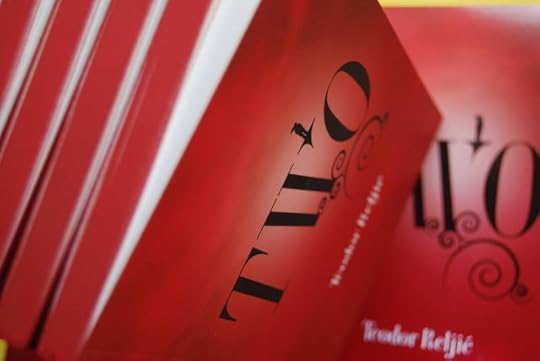
A comic book project of mine is currently on the rocks, but some TV/film based stuff might just take off. Either way, the process of creation for each of these things was markedly different to what I experienced with the novel.
Brewing largely in my head throughout its three-year conception period, Two was as obstinate and unwieldy a draft of novel that you can imagine – perhaps more true than ever in this case, with a parallel narrative structure defining its contours.
The new projects, on the other hand, are being put together in an atmosphere of constant dialogue – quite literally, plot points and character beats are drafted in conversation (with a whiteboard and marker never too far behind).
I’m finding it to be a great way of busting out of the warrens of endless possibility on the one hand, crippling self-doubt on the other, which tend to characterise the pitfalls of writing prose fiction from scratch. Collaboration both gets you out of your own head to enjoy some fresh air, and forces you to ‘make your case’ to another person at every turn.
Discovering the joys of structure mechanisms for storytelling is also something of a revolution for me. Again, like most people I know – or know of – I was initially sceptical of applying any form of overt structure to any piece of fiction I write a priori. For the usual reasons, of course: takes the fun out of it, ruins spontaneity, etc. Breaking out of that prejudice and exploring these options is proving to be far more liberating that I’d previously thought. But that’s something I’d like to talk about further in a future blog.
Here’s hoping that you’ll also hear more about the aforementioned projects here soon. Meanwhile, click here for all you need to know about Two, including where to order it from.


January 15, 2016
Ecstasy of influence: Bowie via Manson
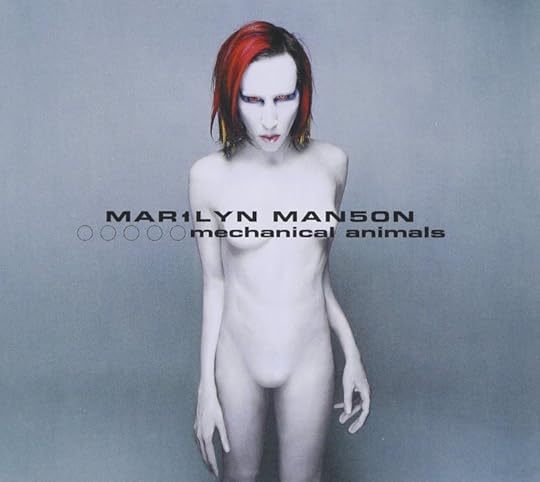
I first got to know about Elmore Leonard through Quentin Tarantino – on that note, Tarantino introduced me to a whole raft of pop culture curios – and I started digging into Norse mythology after Marvel Comics planted a seed in my brain thanks to their version of Thor.
Lovecraft swam into my purview during my teenage years – though I would delve into his stories much later, again – motivated by this initial, delayed spur – through the likes of Metallica and Cradle of Filth, and Lord Dunsany I read after finding out that actually, both Lovecraft and my former literary hero JRR Tolkien were influenced by him.
One of the joys of delving into the DNA of your favourite creative people is finding out, once you crack that shell, what lies beneath. Everyone is influenced by someone else, and this hall of mirrors is what arguably characterises our relentlessly postmodern age. (Should that be post-post-postmodern? I’m not an English undergrad anymore, which frankly means I’m past caring.)
In the case of the late David Bowie, it was Marilyn Manson who did it for me – specifically, the Marilyn Manson of the androgynous Mechanical Animals era.
Now of course, I had known who Bowie was long before my friend Herman loaned me a bootleg tape of the said Manson album (come to that, I of course knew who Manson was before that talismanic tape too). Family lore has it that my aunt and father went out to buy the latest Bowie LP to reach Serbia during a respite from the hospital as my mother was getting ready to give birth to me, even – and I’m sure that same record was spun in my presence after I eventually popped out into the world on that fateful May day in 1985.
But I think I first started to gain an understanding of what Bowie was “about” thanks to Manson’s very deliberate and openly acknowledged cribbing from Bowie during that comparatively brief chapter in “the God of Fuck’s” career.
I wouldn’t really be able to talk about the technical make-up of the songs in Mechanical Animals, so I doubt that I’d be able to construct much of a formal argument in favour of why these songs ‘worked’ on me the way they did.
But neither was it a case of being transfixed by the superficial aspects of Manson’s project, dazzling and sort-of* subversive as they may have been in the pop-culture mainstream at the time. And I say this at the risk of discounting just how mind-blowing it was to me to watch Manson’s performance of The Beautiful People – taken from Antichrist Superstar, the album previous to Mechanical Animals – at the MTV Video Music Awards back in 1997 (I was twelve). It still gives me a thrill of sadistic pleasure to remember the cut-aways to the likes of Sean Combs apparently scandalized by Manson’s bare-bottomed, fascist-attired attack on MTV glamour culture. The hypocrisy of someone like Combs taking apparent offense at Manson still strikes me as telling, in a “gotcha” kind of way.
But Mechanical Animals was certainly a ‘softer’ beast, and its immersive qualities are what seduced me. Beyond the obvious, catchy charms of The Dope Show and I Don’t Like the Drugs (But the Drugs Like Me), songs like The Last Day on Earth and my personal favourite, Coma White, transported me somewhere alien but strangely calming.
The electronic wash that characterises the album still gives me a sense of something cold but meditative, and it’s all helped along by the androgynous surrogate – ‘Omega’ – that Manson created for the purpose of the album. As I would later learn, creating an artistic persona, particularly an androgynous one of this kind, was cribbed from Bowie, who admittedly trumps Manson on this front – not only because he ‘got their first’ but also because he had a far clearer vision about when to adopt these personalities and when to drop them**.
But at the time, it introduced me to the concept of, well, the concept album. Not only that, but the concept album as propped up by an invented personality the performer deliberately took on. In short, the idea of music as storytelling, which has resonated with me ever since.
It’s this echo of Bowie that I’ve carried with me ever since. Of course I’ve listened to Bowie since that time too, though not, I must admit, with the kind of visceral fan-like fervour the teenage me bestowed upon Marilyn Manson.
That’s another thing about influences. You can be introduced to artists askance. Simply put, it wouldn’t have made much sense to me to force myself to listen to Bowie at the time. I was into hard rock and heavy metal, and Manson was a more palatable jumping point into the Bowie milieu for me at that point. This is, of course, the problem with recommending essential works to people with the kind of evangelical zeal we reserve for the very best. We tend to forget that everyone’s on their own journey, and telling them that you HAVE to read/watch/listen to this at that point in their life makes little sense.
If you’re meant to reach it, you’ll reach it. In the meantime you can follow the breadcrumbs you recognise.
*I think I opted for ‘sort-of’ partly because I know Bowie did all this before
**Manson’s dithering post-Holywood career is a testament to this… compare it to how Bowie, despite some flailing years of his own, remained so much in control that he even recorded a final album as a farewell


January 5, 2016
Soundtrack to a speculative action scene
1. Your job is to try not to think of Dredd, but think of something more fragile and immersive.
2. We’re going deeper and wider, and the horror is closing in.
3. Running, jumping. But no fancy parkour. Stylised flames (you have no idea where they came from) just about lick an army of weaponised motorbikes. You notice the giant octopus from the edge of your vision.
4. This is what passes for romance in this world – or at least at this point in time. You recognise the threat and, hands trembling and sweat pouring in FFWD streaks, you try to formulate a plan.
5. Is it a plan of escape, or attack?
6. The moment of hesitation. Death or glory? Whatever the case, this is the point at which we – the sadistic, baying audience – get to revel in the beautiful, dark maw of what’s chasing you. The Gothic, blissful evil that’s more powerful than you could ever have imagined.
7. You have a power, a weapon – whatever. It could be an army of tanks or an armada or a hive of mind-controlled killer bats. Whatever – you’re channelling it, and you’re winning.
8. But for how long?
9. What happened? What’s the outcome? Somebody’s calling, which means somebody is alive. Will they live to fight another day?


January 2, 2016
Uneven but good | Bone Tomahawk
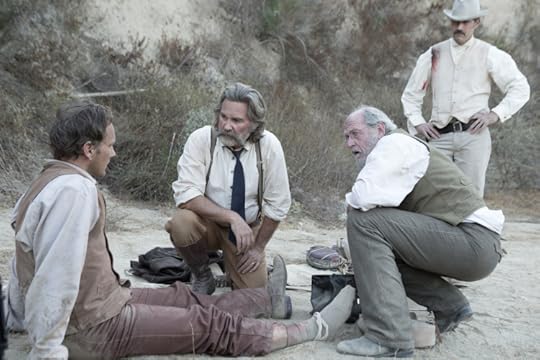
Broken: Patrick Wilson, Kurt Russell, Richard Jenkins and Matthew Fox
Bone Tomahawk is an odd film. But its strangeness sneaks up on you rather than announcing itself straight to your face.
Ostensibly a Western with a fairly straightforward rescue narrative, the fact that it’s something of a genre mash-up (the other ingredient being a sparse but disturbing sprinkling of body horror) is actually not its most significant feature.
Rather, this is down to how the characters – each of them grizzled veterans of some variety – are shaped.
Particularly in the case of the frail, elderly and bumbling deputy sheriff Chicory (Richard Jenkins), this often comes in tangential bits of dialogue. Writer-director S. Craig Zahler, also a novelist, is like a more sincere, less showy Tarantino in the way he wields dialogue. This isn’t a showcase for actors to hypnotise you with acerbic, incantatory language – it’s a showcase for actors to depict the pained, distracted nature of a group of people who are in way over their heads.
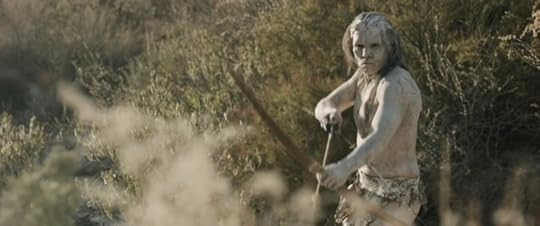
‘Troglodytes’: Things take a nasty turn when our heroes meet a pack of cannibals
In fact, another Western that also stars Kurt Russell – Bone Tomahawk’s hero figure – has been directed by Quentin Tarantino himself, and reached cinemas mere months after Bone Tomahawk appeared.
But I have a feeling that, for all its seemingly throwaway bits of dialogue and its abrupt shifts in tone, Bone Tomahawk will be the one that sticks with me.


January 1, 2016
How Star Wars is like Christmas | Holiday nostalgia
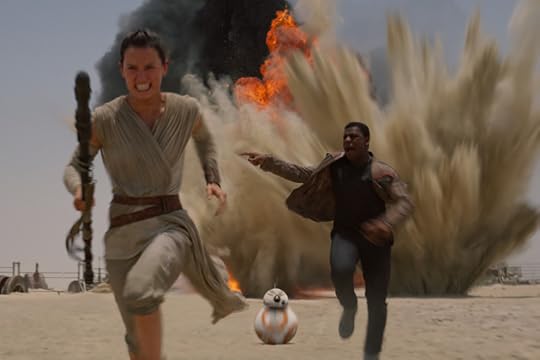
The force awakened come Christmas time. Coincidence? I think not.
My happy places are: Valletta in various moods and times; Sliema at twilight and for lone, spontaneous walks; Attard-Balzan-Rabat for indelible memories and undeniable, cosy beauty and, perhaps topping it all, the childhood fairyland that thankfully remains much the same, Banja Vrujci.

Banja Vrujci
These places and others are what leave an impression – what reminds me of the raw matter that is true happiness and how it can continue to spread when “recollected in tranqulity”.
And in many ways this is how the Christmas period functioned, for me. It’s not a family tradition and latterly it’s become little more than an annoyance for various reasons, but at least it gives me the perfect excuse to eschew all else – intellectual and otherwise – and my quiet little place amid everybody else’s celebratory din helps me to remember all the things that are important to me.
These often come in the form of memories, of course. What we cherry-pick from our past is a very important indicator of what remains important to us.
As I suspect is the case with most people, I’ve been placing quite a bit of stock on my ambitions of late. But such a relentless focus on them means fatigue sets in quick and fast.
So I’ve come to appreciate Christmas – most especially Christmas Day itself – as a kind of oasis.
Just as human beings have the misfortune of being animals saddled with the puzzling gift of self-consciousness – with all its problems – this also means that with enough self-awareness and emotional balance, we can fabricate things about ourselves, to ourselves, for our benefit.
*
Speaking of nostalgia, and variants of it… I really enjoyed the new Star Wars movie. Star Wars, too, is a lot like Christmas (or is it Christmas that’s a lot like Star Wars?).
Because just like Christmas, the franchise is a stark reminder of the pervasive power of capitalism – how it truly has the entire world in its grip, how it appropriates all stories and pieties into its gaping maw to further perpetuate a relentless desire for consumption.
The Christmas story is put aside in favour of “the gift economy” and our expectations for the holiday are calibrated to ‘spend and receive’ – in the same way as our beloved Star Wars characters are intrinsically wended to a film production and distribution model that views the movie and its merchandising as basically interchangeable.
But like Christmas, Star Wars still means a lot of things to a lot of people.
The saga – now in its seventh ‘episode’ – may be suspect in its method of delivery, but what it stimulates in people can’t be denied either.
It’s lovable alongside the cynical nature of its (internal or external?) dynamics, not despite of them.
Of course none of this is ‘natural’, and neither is it self-evident. Like the very act of writing an ‘essay’ – etymologically referring to the process of working things out – all of this is built out of opinions and perceptions chiseled out across time – and it’s entirely open to scrutiny.
But we can choose the fabrications that work the best for us – applying the usual caveat that this is a power we should try use for good and not ill.
But the decision to release The Force Awakens during Christmastime strikes me as a very shrewd fabrication indeed.
*
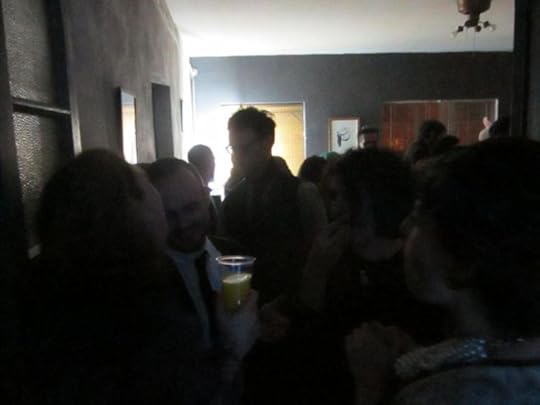
Party at Chez Reljic
New Year’s Eve, in fact, carries more weight for me and my family. This is partly down to national habits – it’s the big blowout celebration of the season in Serbia, gift-giving and all – and family habits too: my sister and I now carry the baton of organising a party each year.
The day after, dazed if not hungover while munching on leftovers, often tends to be an emotionally woozy time.
In more recent years, revisiting the apartment we grew up in to host the party has come with an edge of melancholy. Gentrification means that it’ll soon be beyond my father’s price range (he still rents there) and all of our memories of the place will remain just that.
It’s another reminder of just how important it is to keep mindful of the things that matter. Memories will never be solid, but you should work hard to make them as solid as possible.
*
Have a great 2016, all.


December 17, 2015
Turning Malta into an airport
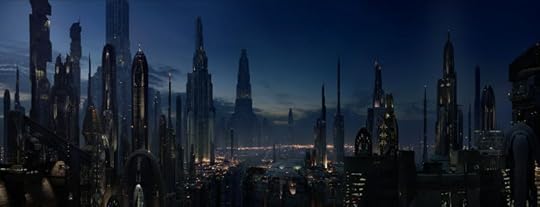
There is something morbidly fascinating about Coruscant – the seat of the Galactic Empire in the Star Wars movies. But do we really want something like this to overtake our ‘real’ world?
The decision to transfer the land at Zonqor Point to Sadeen further proves that Muscat’s government is intent on turning Malta into, essentially, one big airport.
The social and cultural wellbeing of local life – in all its forms – will become further and further sidelined, in the interest of turning Malta into little more than a platform, a jumping on and off point for financially powerful international players able to pump money, but little else, back into the island.
Obviously, Muscat’s aggressive neo-liberal philosophy is an easy ‘sell’ in every sense of the word.
It’s easy because capitalism is the primary motor of the world right now, and so many will either be swayed immediately, or convinced to look the other way, when there’s an immediate inrush of money to be made.
One meme that has circulated ever since the Zonqor/ODZ debacle first started raging, was the old chestnut about the environment being a ‘middle class’ concern – something that only the bourgeois presumably had the luxury to cry over when others would welcome any boost to their pockets.
But Malta isn’t a poor country. Those proposing some kind of stark division between the haves and have-nots, particularly on vague – read: false – ‘cultural’ grounds are misguided in every sense of the word. Malta ‘needs’ this project like it needs a bullet to its – limestone – head.
Also, saying that the previous government did exactly the same thing as some kind of excuse to make the current mistakes seem better in comparison, is also deceptive and false.
If anything, it is precisely BECAUSE the previous government operated on the same principles that the need to safeguard our environment is becoming all the more urgent.
Supporting the ‘American’ University makes you neither a champion of successful government hustling for cash, and it certainly doesn’t make you a champion of the supposedly impoverished underclass that stands to gain from this toxic land-grab.
All it makes you is a supporter of the status quo.
A status quo that would sooner have Malta as an extension of the Malta International Airport.
Paved to ‘perfection’, with artificial outlets providing transitory needs for transitory people.
Of course, right after Muscat and co. have demolished all that is unique and attractive about the Maltese islands, the supposed economic excitement this is meant to engender will gradually fade away.
But of course, who will care at that point? The locals will be dulled into submission by promises of more money, or will have moved away in disgust. And Muscat’s decisions will have insulated him from any further unpleasantness or hurt.
*
I’m writing this while I eagerly await a screening of Star Wars: The Force Awakens in a beautiful Parisian cinema. On the one hand, the impulse of looking forward to a cash-boosted blockbuster – the legacy of which is actually directly wended to the financial behemoth of the blockbuster as we know it – appears to be in direct opposition to the sentiment expressed above.
But as with all things, it’s down to how you process them individually.
Various thoughts and feelings jostle within us at any given time.
The influence of Star Wars on how I viewed storytelling will always have an influence on anything that I do. As will my indignation – and yes, sense of powerlessness – at something like the Zonqor tragedy.
I’m hoping that something productive comes out of this alchemy, very soon. And with the help of some truly inspired friends and collaborators.





